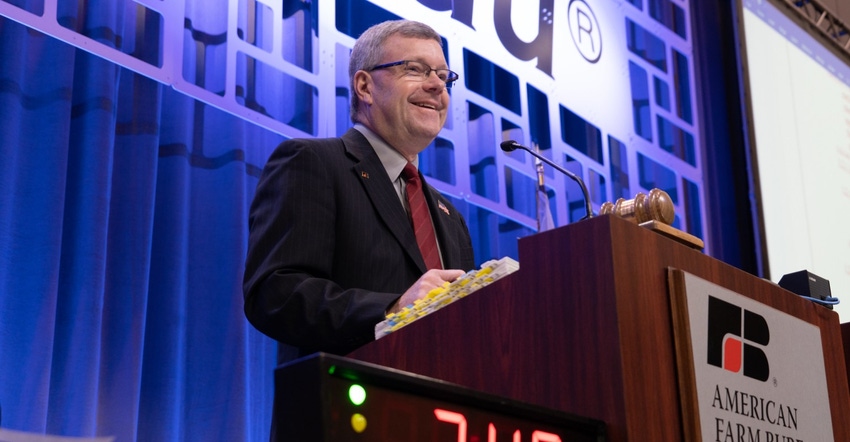Farm Bureau sets yearlong policy
Priorities for 2020 range from helping dairy producers remain profitable to directing guidance on how to address climate change.

The largest farm group -- the American Farm Bureau Federation (AFBF) -- wrapped up its multi-day annual meeting in Austin, Texas, finalizing grassroots policy directives from its delegates on Tuesday morning. Delegates agreed to policies to guide the organization’s work in 2020 on key topics ranging from dairy to labor and climate change to conservation compliance.
AFBF vice president Scott VanderWal said many producers are going into 2020 with a “long tail from 2019,” and farmers are looking at a tough year. He said he thinks the support for this Administration and recently advanced trade agreements remains “strong and solid,” but farmers are still concerned about income in 2020. He added that in his area in the Upper Midwest, many farmers face tough conversations across the desk from their bankers.
Dairy provisions
After a year-long process to review ways to modernize Federal Milk Marketing Orders, the AFBF delegates voted to support the creation of a flexible, farmer- and industry-led milk management system. This includes giving individual dairy farmers a voice by allowing them to vote independently and confidentially on rules governing milk prices. The new dairy policies, when combined, will form a strong foundation to guide the organization during future reform efforts to better coordinate milk supply and demand in the U.S.
In a press conference, VanderWal said there is a lot of frustration over the severe and long-standing lack of profitability for the dairy industry. He said the agreed-to policy directives aim to create a pricing structure in the U.S. that is fairer and reduces the overlap and duplicity that currently make the dairy industry less efficient. The goal is for this to translate into higher prices dairy producers receive from processors.
“If processors aren’t very efficient, it takes away from the milk check,” he said.
“Part of the policy we adopted would provide for producers to be able to vote in a referendum rather than a co-op voting for them,” VanderWal explained.
There was also strong agreement for component pricing.
Labor
Delegates updated labor and immigration policies, emphasizing that significant changes must be made to the H-2A program. While AFBF has long had policy in place to ensure an accessible, competitive guestworker program, the updates address problems with the adverse effect wage rate and emphasize the importance of year-round program access to all sectors of agriculture.
Last fall, AFBF opposed the House’s approach to an agricultural guestworker program despite being actively involved in discussions in developing the legislation over the year.
“AFBF looks forward to working with Congress on efforts that align with these policy objectives,” the group said in a statement.
Climate change and conservation efforts
New policies are on the books supporting science-based climate change research and documentation of the agriculture industry’s tremendous advances toward climate-smart practices. Delegates also made it clear that they want federal climate change policy to reflect regional variations and that they oppose a state-by-state patchwork of climate change policies.
VanderWal said the organization remains committed to being responsible stewards of the land and look at ways to collaboratively reduce greenhouse gas emissions without government intervention.
There are significant new policies on conservation compliance. Delegates called on the U.S. Department of Agriculture to significantly improve program transparency and due process for farmers. They specifically prioritized changes in USDA’s processes for wetland delineations and the appeals process. Delegates also adopted a new policy supporting the repeal of Swampbuster provisions. The changes highlight growing frustration with conservation compliance practices within USDA's Natural Resources Conservation Service.
Hemp
Delegates voted to support allowing a higher tetrahyrdocannabinol (THC) level in hemp, giving AFBF staff the flexibility to engage in discussions with regulators about the appropriate legal level and to increase the window of time farmers are allowed to conduct THC testing, acknowledging the many questions about how the testing process will work and the potential for backlogs.
USDA has already heard concern from some senators who are saying the THC threshold is arbitrary and far too low.
About the Author(s)
You May Also Like





